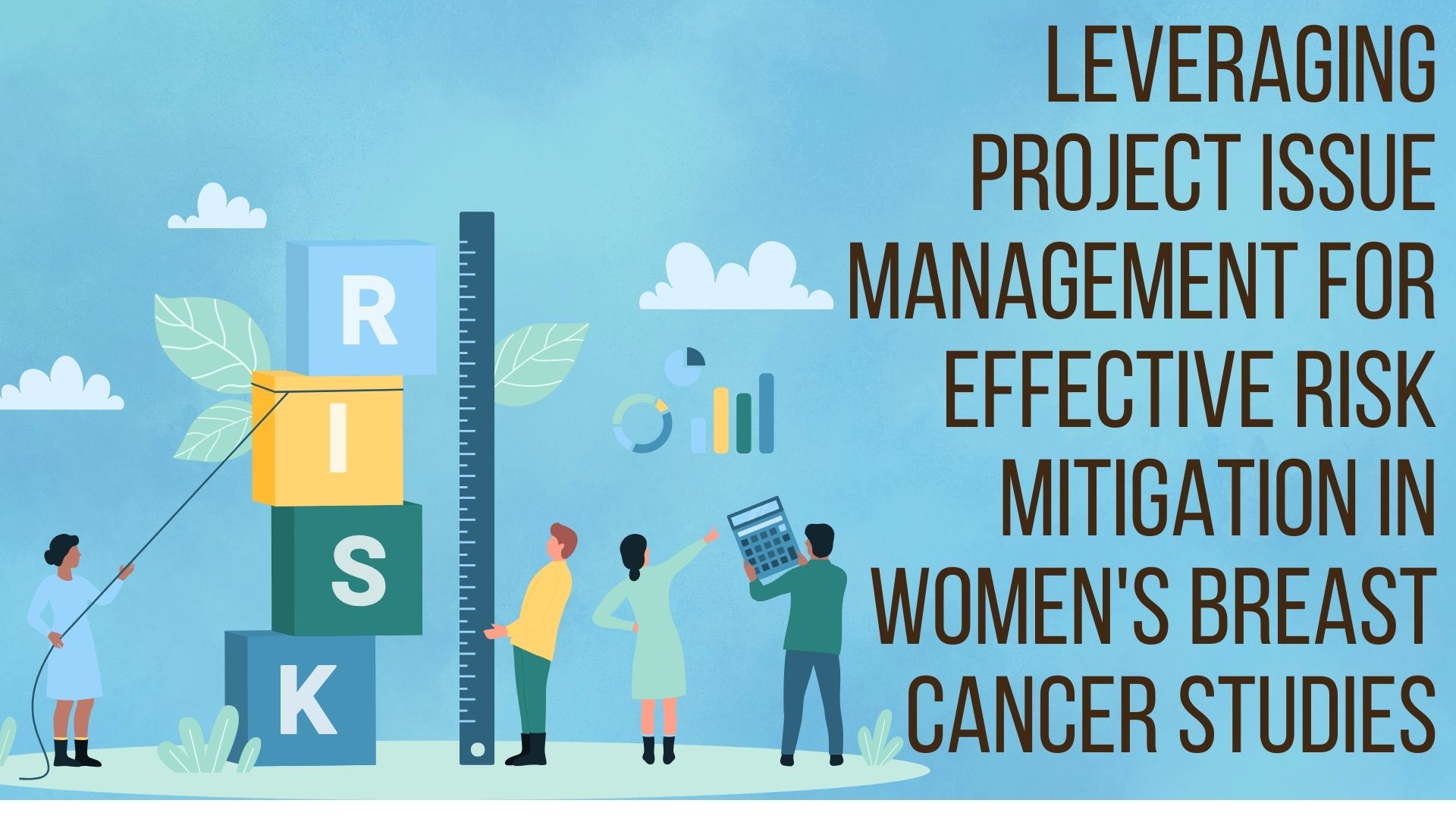Risk management and decision-making are paramount in medical research, especially when studying critical diseases such as breast cancer. Effective management of issues throughout a project, particularly in community-based studies involving vulnerable populations such as women with breast cancer, can significantly improve the outcomes and quality of the research. Project Issue Management (PIM) plays a crucial role in identifying, assessing, and addressing potential risks, ultimately enhancing research efforts’ overall efficiency and impact.
Understanding Project Issue Management
Project Issue Management refers to the systematic process of identifying, analyzing, and addressing issues and risks that could impact a project’s progress, success, and outcomes. This process is crucial in fields where risk factors are ever-present, such as medical research, where unexpected challenges or complications can arise at any stage.
In the context of women’s breast cancer research, the Project Issue Management approach helps to navigate obstacles that may emerge due to the complexity of the disease, the ethical considerations involved, the diversity of the patient population, and the fluctuating nature of funding and resources. For instance, issues can arise from patients’ reluctance to participate due to fear or misinformation, data inaccuracies, lack of necessary equipment, or insufficient funding to carry out the study as planned.
Risk Management in Women’s Breast Cancer Research
Women’s breast cancer remains one of the most diagnosed cancers worldwide, with millions of women affected each year. Due to the complexity of the disease, studying its causes, treatments, and outcomes involves numerous variables and risks that must be managed carefully. Risk management in this context refers to identifying, assessing, and mitigating the potential challenges hindering progress.
Key Risks in Breast Cancer Research:
- Ethical Risks: Breast cancer research often involves vulnerable populations, which may lead to ethical dilemmas around patient consent, confidentiality, and how to communicate findings responsibly.
- Data Integrity Risks: Since breast cancer studies rely heavily on accurate data for diagnosis and treatment assessments, data inaccuracies or misinterpretation of results can significantly impact conclusions and the effectiveness of treatments.
- Patient Compliance Risks: Women in research studies may face personal, cultural, or logistical barriers to following protocols, leading to inconsistent data or study discontinuation.
- Regulatory Risks: Given the highly regulated nature of medical research, any failure to adhere to guidelines, such as human subject protections, can halt a study and cause reputational damage.
- Funding and Resource Risks: Lack of funding can delay or halt studies. Managing the funding process and ensuring that resources are effectively allocated is critical to continuing research efforts.
The Role of Community-Based Samples in Research
In recent years, community-based research, particularly with a focus on minority populations, has become increasingly important in understanding and addressing breast cancer disparities. Community-based samples involving women from diverse socioeconomic, ethnic, and geographic backgrounds provide a more comprehensive understanding of the disease and its impact across various demographics.
However, using a community-based sample introduces new risks. Diverse samples might face challenges related to:
- Cultural Sensitivity: Understanding participants’ cultural beliefs and practices is vital for ensuring accurate data collection and patient cooperation.
- Informed Consent: Ensuring that participants fully understand the research objectives and the implications of their participation, especially in marginalized communities, can be challenging.
- Effective Project Issue Management ensures that these risks are addressed early on, allowing the research to progress smoothly and produce reliable results that benefit all populations.
How Project Issue Management Improves Decision-Making
In breast cancer research, integrating Project Issue Management directly contributes to better decision-making, particularly by ensuring timely identification of risks, facilitating informed responses, and helping researchers make critical decisions. Here’s how it works:
1. Identifying Potential Risks Early
A critical element of Project Issue Management is its proactive approach to identifying risks at the earliest stage of the project. For instance, researchers may identify risks related to community engagement early in the planning stages, such as low participant enrollment due to a lack of trust in medical research. By recognizing such risks, the research team can adapt strategies (such as outreach programs, education campaigns, and partnerships with community leaders) to mitigate these concerns before they impede the study.
2. Managing Ethical and Social Issues
Ethical and social issues are particularly prevalent in cancer studies, where decisions around patient confidentiality, consent, and sharing results are critical. Project Issue Management frameworks allow researchers to establish ethical guidelines and regularly review them to ensure compliance. For example, if ethical dilemmas arise during the study – such as issues regarding informed consent or the use of sensitive data – the team can quickly assess the situation, collaborate with ethical boards, and implement a solution that preserves the study’s integrity and participants’ rights.
3. Optimizing Resource Allocation
In community-based research, particularly in high-stakes areas like breast cancer, researchers must effectively manage allocating resources such as funding, personnel, and technology. Inefficient use of resources can lead to significant delays or even failure to meet project objectives. Project Issue Management tools can help identify potential resource gaps early on and address them before they derail the study. For instance, if funding begins to dwindle, early detection can prompt the team to seek alternative funding sources or adjust the scope of the research to align with available resources.
4. Risk Analysis and Mitigation
Once risks are identified, the next step in Project Issue Management is conducting a risk analysis to understand each issue’s severity and potential impact. For example, in breast cancer research, if data integrity is at risk due to a malfunctioning data tracking system, the team can assess the potential consequences and implement contingency plans. If the risk is severe, immediate action – such as investing in a new data tracking system or working with external partners to rectify the issue – can be taken to prevent disruptions.
For instance, if patient participation drops due to unforeseen social or cultural barriers, a quick response could involve outreach to educate the community better or offer incentives for participation. This responsiveness allows for the dynamic decision-making necessary to keep the study on track.
Addressing Data Security and Patient Privacy
In medical research, particularly involving community-based samples, the privacy and security of patient data are non-negotiable. In breast cancer studies, sensitive data—such as genetic information, medical histories, and treatment responses—must be protected to prevent misuse or breaches.
Project Issue Management frameworks ensure that these risks are managed by incorporating secure data management systems, regular audits, and compliance with privacy laws. Researchers can safeguard participants’ privacy while ensuring data integrity by addressing potential security breaches early and continually reviewing data handling procedures.
Key Benefits of Project Issue Management in Breast Cancer Research
- Improved Risk Mitigation: By identifying and addressing potential risks early, researchers can prevent minor issues from escalating into significant obstacles that delay or derail the study.
- Better Resource Management: Efficient use of resources, such as funding and personnel, ensures that the study remains on schedule and within budget.
- Enhanced Decision-Making: With timely information on risks and issues, researchers can make informed decisions that enhance the study’s chances of success.
- Increased Stakeholder Confidence: Demonstrating effective issue management builds trust with participants, funders, and other stakeholders, leading to smoother collaboration and support.
Integrating Project Issue Management into breast cancer research, particularly in community-based studies, is essential in ensuring the success of these critical endeavors. This approach enhances decision-making, promotes data security, and ultimately improves outcomes for women affected by breast cancer by identifying risks, managing resources, and responding to challenges with agility. With the ongoing advancements in medical research and technology, Project Issue Management tools will continue to play a vital role in enhancing breast cancer studies’ efficiency, effectiveness, and integrity. By leveraging these tools, researchers can ensure that they remain focused on their goal – finding a cure for breast cancer and improving the lives of millions of women worldwide.
Sources:
- National Cancer Institute – https://www.cancer.gov/types/breast
- Project Management Institute (PMI) – https://www.pmi.org/learning/library/issue-management-projects-6172
- Breast Cancer Research Foundation (BCRF) – https://www.bcrf.org/research/
- Harvard Business Review – https://hbr.org/2018/10/why-issue-management-matters
- World Health Organization – https://www.who.int/news-room/fact-sheets/detail/breast-cancer





